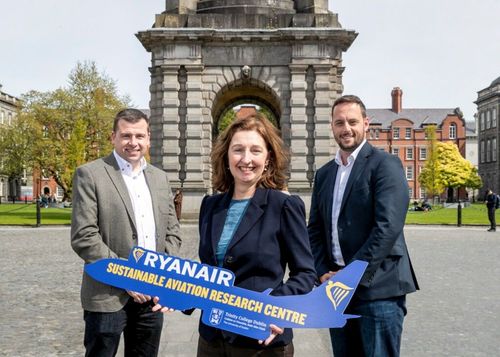Ryanair donates to SAF research

Thomas Fowler Director of Sustainability and Finance Ryanair, Sinead Ryan Dean of Research, Trinity College Dublin and Steven Fitzgerald Deputy Director of Sustainability and Finance, Ryanair. / SOURCE: Ryanair
May 16, 2024
BY Ryanair
Ryanair, Europe’s no. 1 airline, announced on May 9 the extension of its partnership with Trinity College Dublin out to the end of the decade as the airline makes a further €2.5 million donation (€4 million total) to fund the Ryanair Sustainable Aviation Research Centre.
Underpinned by an initial €1.5m donation from Ryanair, Research at the Ryanair Sustainable Aviation Research Centre started in Sept 2021 addressing the complex challenge of progressing sustainable aviation. With Ryanair’s extended funding, the multi-disciplinary research team will continue to focus on Sustainable Aviation Fuel (SAF) and zero carbon aircraft propulsion systems as well as expanding the scope of the research to examine aviation’s non-CO2 emissions.
Advertisement
Over the past 3 years, the Ryanair Sustainable Aviation Research Centre has made significant research developments in the following core areas;
- examining the sustainability of different SAF types
- reducing the cost to certify new SAF candidates
- evaluating the operating impact of zero carbon aircraft propulsion and noise mapping
Results of this research, which have been presented at the European Union Aviation Safety Agency, show that the emission intensity of a passenger travelling on a Boeing 737-800 NG flight from Amsterdam to Dublin can be reduced by 43% by using a 50% SAF blend. This could be further reduced by using Ryanair’s ‘Gamechanger’ Boeing 737-8200, which is 16% more fuel efficient than the 737-800 NG.
Ryanair’s Director of Sustainability, Thomas Fowler, said, “Progressing towards our ambitious sustainability goals of Net Zero by 2050 and 12.5% SAF by 2030 will not be possible without continued support for the best-in-class research that is being done by the Ryanair Sustainable Aviation Research Centre at Trinity College Dublin. Expanding out the research to better understand the non-CO2 impacts from aviation is an important next step to lead our industry towards more sustainable aviation.”
Advertisement
Linda Doyle, Provost and President of Trinity College Dublin, said, “Research must be central to combating climate change and promoting sustainable transport. Trinity is now recognized as the 14th best university in the world in delivering the UN Sustainable Development Goals, and has become a go-to international destination for sustainable aviation research. I want to thank Ryanair for their support: It is good news for the researchers in the Centre and for the students who will benefit from the teaching arising from the research.”
Professor Sinéad Ryan, Dean of Research at Trinity College Dublin, said, “Advancing sustainable aviation presents a complex challenge, which requires the multidisciplinary approach we take here in Trinity. Ryanair’s continued support will help to ensure ongoing and new research projects deliver a number of improvements and innovations, as well as supporting interactions with regulators, policy makers and aircraft manufacturers in the pursuit of more economically and environmentally sustainable commercial aviation.”
Related Stories
Neste and DHL Express have strengthened their collaboration with the supply of 7,400 tons (9.5 million liters) of neat, i.e. unblended, Neste MY Sustainable Aviation Fuel to DHL Express at Singapore Changi Airport starting July 2025.
CoBank’s latest quarterly research report, released July 10, highlights current uncertainty around the implementation of three biofuel policies, RFS RVOs, small refinery exemptions (SREs) and the 45Z clean fuels production tax credit.
The U.S. Energy Information Administration maintained its forecast for 2025 and 2026 biodiesel, renewable diesel and sustainable aviation fuel (SAF) production in its latest Short-Term Energy Outlook, released July 8.
XCF Global Inc. on July 10 shared its strategic plan to invest close to $1 billion in developing a network of SAF production facilities, expanding its U.S. footprint, and advancing its international growth strategy.
U.S. fuel ethanol capacity fell slightly in April, while biodiesel and renewable diesel capacity held steady, according to data released by the U.S. EIA on June 30. Feedstock consumption was down when compared to the previous month.
Upcoming Events










